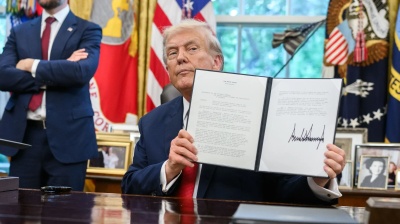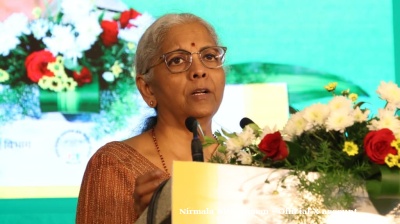Bulgaria was thrown into fresh political crisis on March 19 when Gerb’s nomination for prime minister, Mariya Gabriel, ended negotiations with Change Continues-Democratic Bulgaria (CC-DB).
In a surprising move, Gabriel returned to President Rumen Radev the mandate with a list of nominated candidates for ministers, despite not having a majority without CC-DB’s support — or agreement with the candidates on the list.
All the ministers nominated by Gabriel, including outgoing Prime Minister Nikolai Denkov, said that since they were never asked for nor have they given their consent to be included, they want their names to be removed.
Nine months ago, Gerb and CC-DB – until then fierce opponents – decided to set aside their differences and back a jointly formed government, comprising mainly non-political experts, to be headed for the first nine months by CC-DB’s Nikolai Denkov and then for another nine months by Gabriel. The two would then switch their positions.
Gabriel’s move, although seemingly paving the way for the rotation agreed between Gerb and CC-DB, has now blown up the complicated process of negotiating the rotation from Denkov to Gabriel.
Denkov’s government has already resigned, as agreed, but Gerb and CC-DB have struggled to reach agreement on plans for the next nine months.
Gerb now has two options: an early general election or a government with the third mandate, which is highly likely to be handed to the Movement for Rights and Freedoms (DPS), the third largest political party in parliament after Gerb and CC-DB.
A snap vote seems more likely as Gerb’s leader Boyko Borissov might not be willing to strike an official coalition with the DPS. In that case, the snap vote could be held at the beginning of June along with the European Parliament election.
Eurozone, full Schengen entry on hold
No matter which option Gerb picks, Bulgaria will most likely freeze its path towards membership in the eurozone and full Schengen membership again.
On April 1, the country will no longer have air and sea borders with the Schengen members but the decision on lifting the land borders will depend on certain reforms.
Sofia was hoping to get a green light to enter the eurozone in 2025. However, if the country is heading towards its sixth early election in a row, it would take time for lawmakers to adopt the necessary reforms to make that possible.
In external politics, Bulgaria’s aid to Ukraine might also be put on hold once again. Current outgoing Defence Minister Todor Tagarev was very active in his efforts to support Kyiv.
Avoiding reforms?
There is speculation, backed up by comments from members of CC-DB, that Gerb may have submitted the mandate without a deal with its partners in order to avoid signing an agreement setting out the reform agenda.
The agreement includes a detailed plan of upcoming reforms and decision-making mechanisms, and excludes a restriction — wanted by Gerb — that the two formations can only seek support in parliament from the DPS.
Prominent political analyst Evgenii Dainov called Gabriel’s move a “provocation” and pointed out that Gerb was putting a lot of effort into not signing an agreement with CC-DB.
“Apparently the goal of the whole exercise was in the chaos they do not sign this document and nobody notices that,” he wrote on Facebook.
A few hours later, the leaders of CC-DB and all ministers in Denkov’s outgoing government who Gabriel had included in her proposed cabinet, held a press conference.
They said they would not support Gabriel’s government and the ministerial nominees said they had sent written requests to Radev and parliament speaker Rossen Zhelyazkov to be excluded.
Hristo Ivanov, co-leader of CC-DB, accused Gerb leader Boyko Borissov and the DPS’ Deelyan Peevski of blowing up the fragile and complicated government structure as they do not want judicial reforms to be completed. Slavov said that his ministry has been ready for months with all legislation changes to complete the reform.
Bulgarians reluctant to hold new elections
According to polls carried out before the March 19 development, 40% of Bulgarians do not want yet another early election and would prefer the rotational government to continue governing the country.
Just 27% would rather have a snap vote and 9% would like the outgoing government to continue its work, a poll carried out by Alpha Research showed earlier in March.
The same poll showed that Gerb would win a snap election but with just 23.7% of the vote, followed by CC-DB with 19.2%, far-right pro-Russian Vazrazhdane with 12.8%, the DPS with 9.7%, the Bulgarian Socialist Party (BSP) with 9.6% and There Are Such People (ITN) with 5.1%. This would almost repeat the results from the previous snap vote, held in April 2023 and would make it difficult for political parties to form a ruling coalition.
A coalition within the current parliament is also possible if Gerb decides to officially join forces with the DPS. The two parties have a long history of informal cooperation and are acting as one party in the current parliament. If ITN and four independent MPs (former members of Vazrazhdane) also join, the coalition would have 120 out of 240 MPs. This option could, however, damage Gerb’s image as DPS and its newly-elected co-leader, the Magnitsky-sanctioned Peevski, have been accused for years of involvement in widespread corruption and murky deals.
News

No Tomahawks for Ukraine, Trump to meet Putin in Hungary
The US cannot deplete its own stockpile of Tomahawk cruise missiles by supplying them to Ukraine, President Donald Trump said at a press conference on October 16 following a phone conversation with Russian President Vladimir Putin.

Bangladesh seeks death penalty for former Prime Minister Hasina
Bangladesh’s interim administration led by Nobel laureate Muhammad Yunus has requested the country’s criminal tribunal impose the death penalty on former Prime Minister Sheikh Hasina

US ambassador thanks Turkey for role in "coordinated squeeze" that forced Hamas to surrender
Ankara, Cairo and Doha took part in tactics that made Palestinian group accept deal it did not want.

Trump authorises CIA covert operations in Venezuela to topple Maduro
The White House has acknowledged granting the Central Intelligence Agency sweeping powers to conduct covert operations aimed at unseating President Nicolás Maduro, the NYT reported.




